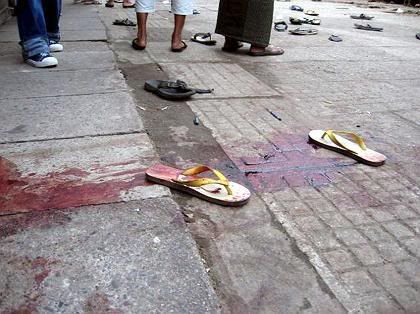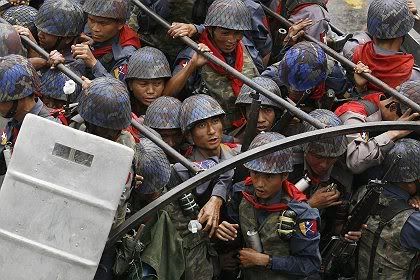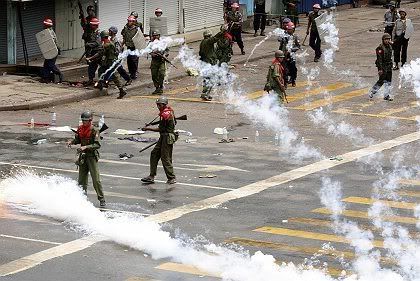 Burma is one of the most Buddhist countries in the world, surpassed only by the hermit kingdom of Bhutan. Every adult male in Burma is required to spend several weeks or months in a monastery at least once in their lives. Burma experts estimate that the country contains between 400,000 to 800,000 Buddhist monks–compared with 400,000 soldiers.
Burma is one of the most Buddhist countries in the world, surpassed only by the hermit kingdom of Bhutan. Every adult male in Burma is required to spend several weeks or months in a monastery at least once in their lives. Burma experts estimate that the country contains between 400,000 to 800,000 Buddhist monks–compared with 400,000 soldiers. Superstition and spirituality are heavily ingrained in Burmese culture. The top generals in Burma’s junta regularly consult astrologers for advice on how to retain power.
In early 2005, General Than Shwe, the leader of the junta, built a new capital in the middle of a jungle on the advice of a fortune teller, who had told the general that the only way to stay in power was to move the capital to the unpopulated area.
In the summer of the same year, Than Shwe asked his chief astrologer when the luckiest day would be to move into the empty new town, Napyidaw ("royal land"). The astrologer gazed into the stars and responded, "At 6:37 a.m. on November 6, 2005."
At the "auspiciously lucky" moment, a massive convoy of military trucks filled with furniture rolled into Napyidaw.
In 2003, five years after crushing pro-democracy demonstrations with deadly force, the junta permitted a white elephant that had been discovered in the jungle to be brought to Yangon. A fresh temple was erected so the white elephant, a symbol of luck, could be placed on public display. Popular belief held that the white elephant signified that the gods approved of the dictatorship.
While the military dictatorship that rules Burma appears to have very few scruples, it has consistently sought the blessings of Buddha, the gods and the 36 "Nats" (Burma’s own spirits).
In the 1970's, dictator Ne Win, who ruled Burma from 1962 to 1988, wreaked havoc with Burma’s currency in an effort to please the gods. Ne Win outlawed the 100 kyat note and replaced it with the bizarre 90 kyat note. The number ninety is considered lucky in Burma, and Ne Win hoped that the new 90 kyat notes would earn him many blessings and the respect of his countrymen.
China, with its heavy-handed policies in Tibet, has not exactly been a great friend to Buddhism. In a strange twist, the fate of the tens of thousands of monks who have defied the junta by leading mass protests rests squarely upon China, Burma’s largest trading partner and traditional ally. The regime cannot possibly maintain its tenuous grip on power without the continued aid and support of its neighbor, China.
Chinese diplomats recently advised Burma’s generals to seek a peaceful outcome through moderate democratic reforms. Yesterday, however, as Burma’s military opened fire into a crowd of thousands of monks, China and Russia blocked discussion of diplomatic sanctions or a statement of condemnation from the United Nations Security Council.




No comments:
Post a Comment